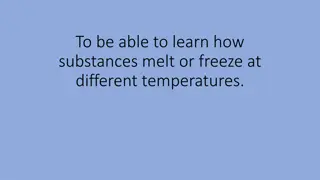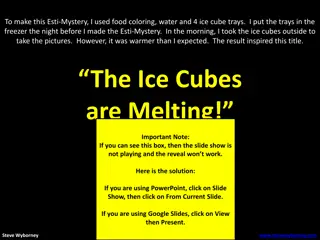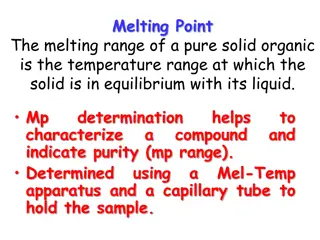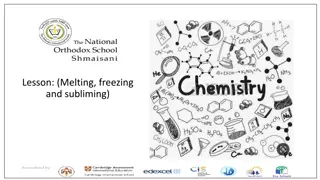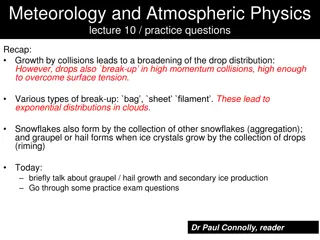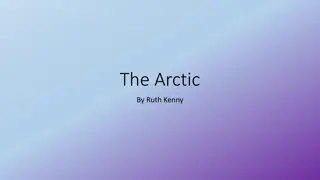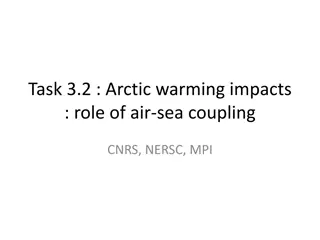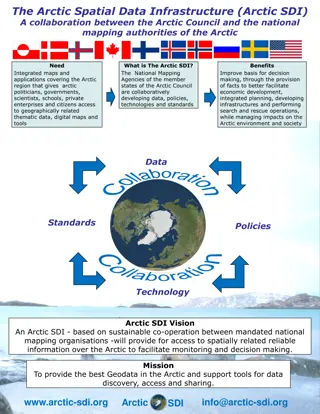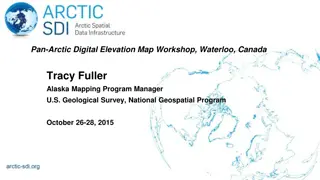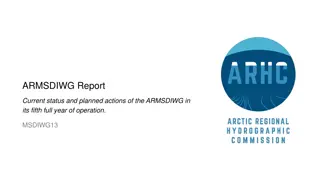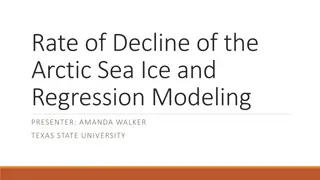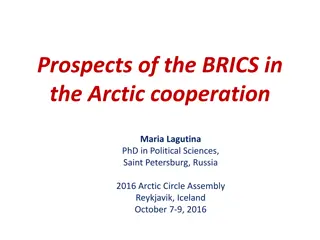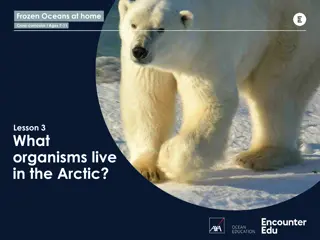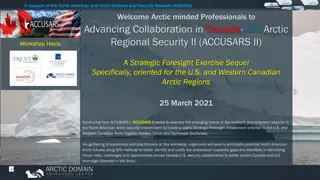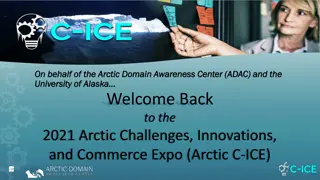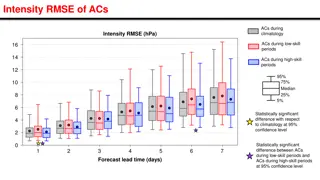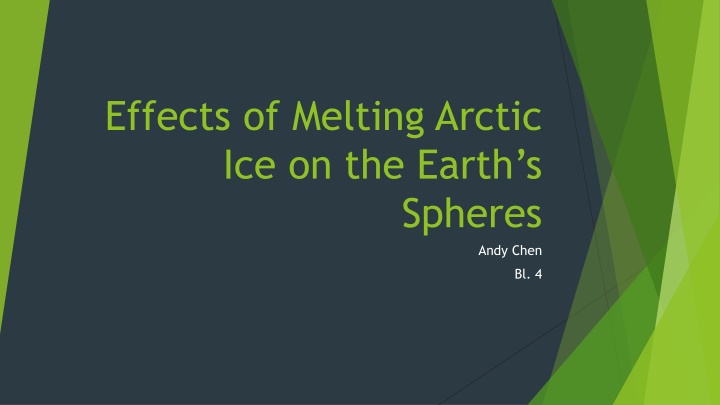
Impact of Melting Arctic Ice on Earth's Spheres
The melting of Arctic ice caps is primarily caused by increased fossil fuel usage and greenhouse gas emissions, leading to rising sea levels, erosion, and property damage. This phenomenon affects the geosphere by causing flooding, erosion, and potential release of fossil fuels. In the atmosphere, it results in increased greenhouse gases, global temperatures, and storm power. The hydrosphere is impacted by the release of freshwater from melting ice caps, affecting ocean circulation and potentially disrupting the thermohaline conveyor belt.
Download Presentation

Please find below an Image/Link to download the presentation.
The content on the website is provided AS IS for your information and personal use only. It may not be sold, licensed, or shared on other websites without obtaining consent from the author. If you encounter any issues during the download, it is possible that the publisher has removed the file from their server.
You are allowed to download the files provided on this website for personal or commercial use, subject to the condition that they are used lawfully. All files are the property of their respective owners.
The content on the website is provided AS IS for your information and personal use only. It may not be sold, licensed, or shared on other websites without obtaining consent from the author.
E N D
Presentation Transcript
Effects of Melting Arctic Ice on the Earth s Spheres Andy Chen Bl. 4
Why are the Arctic ice caps melting? Natural cycle of melt/reform Minimum ice at mid-September Re-forms at spring Current melting not natural Increased fossil fuel usage Increased greenhouse gases Increased global average temperature More melts during summer, less re-forms Water less reflective than ice, absorbs more heat Melting ice caps -> more water vapour in air Water vapour is a very effective greenhouse gas. Water is less reflective than ice, and absorbs more heat More ice melts.
How does this affect the geosphere? Rising sea levels caused by melting ice Expected rise of 0.66-6ft by 2100 Causes flooding of low-lying areas More erosion caused by water Property damage Believed that 22% of the world s fossil fuels are below Arctic Ice Increased fossil fuel usage Increased greenhouse gases Increased global average temperature More melts during summer, less re-forms Water less reflective than ice, absorbs more heat Can cause a loop where melting Arctic ice causes more ice to melt
How does this affect the atmosphere? Potentially most fossil fuels below Arctic Ice Increased fossil fuel usage Increased greenhouse gases in atmosphere Increased global temperature Rising sea levels caused by increased global temperatures and melting ice Increased melting of ice from ice sheets More water vapour in air Water vapour is a very effective greenhouse gas Increased storm power & frequency Large methane stores trapped inside Arctic permafrost Methane is an extremely powerful greenhouse gas 23x more powerful than CO2 Can greatly increase average global temperatures http://www.blog.thesietch.org/wp- content/uploads/2010/03/methane1_h1.jpg
How does this affect the hydrosphere? Ice melts from Arctic ice cap Water absorbs more heat than ice Global temperature increase Thermohaline Circulation Ice melts from all ice caps Greenland s ice cap melt adds 300 cubic km of water to the sea per year Sea levels increase Fresh water in ice released 68% of all freshwater is in ice caps & glaciers Freshwater can disrupt thermohaline circulation Conveyer belt that cycles water between the equator and pole Keeps Europe warm Scientists predict it will be a distant threat http://energyeducation.ca/wiki/images/thumb/a/ad/Ocean_circula tion_conveyor_belt.jpg/400px-Ocean_circulation_conveyor_belt.jpg
How does this affect the biosphere? Habitat of Arctic animals(Polar bears, seals, etc.) destroyed Less ice to live on Aboriginal peoples couldn t hunt many seals/walruses on foot, had to hunt by boat Unable to provide enough food for village in some cases Ice that was there was unstable Very thin, breaking apart earlier Less ice to hunt on Less ice to shelter young on Decreasing numbers of Arctic animals As the temperature increases, permafrost melts Increases amount of shrubs in the tundra Shrubs insulate the soil, speeds up decomposition
How the Earths Spheres are Interconnected The Arctic ice cap is part of the hydrosphere, but it melting affects all of the other spheres of the Earth. The geosphere contains fossil fuels, which is one of the primary causes of the Arctic ice cap melt. The ice cap melt also causes more erosion of the geosphere. The atmosphere is affected by the hydrosphere, as more water in the oceans means that storms will be stronger and more plentiful. The melting of ice in the Arctic can also release the large stores of methane trapped in the permafrost. The biosphere relies on all other spheres for habitats, and the atmosphere and hydrosphere specifically for elements necessary for life. With the melting of the Arctic ice caps, many animals will lose their habitat, either because they live on the ice itself, or because their habitat is close to the shore.
Is this a global problem? I believe that the melting of the Arctic ice caps is a global problem, simply because it affects all spheres of the Earth. All areas of the Earth are affected by the atmosphere, the hydrosphere, and the geosphere. Although the effects may not be noticeable at the current moment, if nobody tries to stop it everyone on earth will feel the effects. Many major cities are very close to the shoreline, and are very vulnerable to rising sea levels. Tropical storms will just keep on getting stronger, causing more and more damage.
Sources https://prezi.com/gqbjuo2m_xxl/effects-of-arctic-ice-cap-melting/ https://nsidc.org/cryosphere/seaice/environment/indigenous_impacts.html https://www.scientificamerican.com/article/arctic-ice-melts-cause-rising-sea/ https://prezi.com/zxqbwgmhzrgy/how-does-melting-ice-affect-earths-spheres-and- sustainabilit/?webgl=0 https://e360.yale.edu/features/as_arctic_ocean_ice_disappears_global_climate_impacts_intensify_ wadhams https://www.nationalgeographic.com/environment/global-warming/big-thaw/ http://blogs.ei.columbia.edu/2012/12/06/how-the-warming-arctic-affects-us-all/

